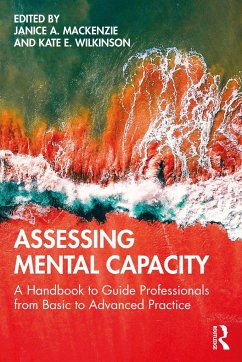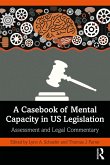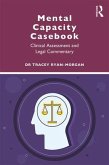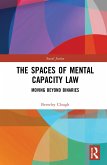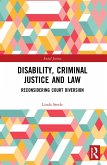Assessing Mental Capacity
A Handbook to Guide Professionals from Basic to Advanced Practice
Herausgeber: Mackenzie, Janice A.; Wilkinson, Kate E.
Assessing Mental Capacity
A Handbook to Guide Professionals from Basic to Advanced Practice
Herausgeber: Mackenzie, Janice A.; Wilkinson, Kate E.
- Broschiertes Buch
- Merkliste
- Auf die Merkliste
- Bewerten Bewerten
- Teilen
- Produkt teilen
- Produkterinnerung
- Produkterinnerung
Drawing on expertise from neuropsychologists, solicitors, and social workers, Assessing Mental Capacity provides a practical guide for all those required to carry out such assessments, considering the basics of capacity assessments and law, how to make difficult decisions, and how to draw conclusions from capacity assessments.
Andere Kunden interessierten sich auch für
![A Casebook of Mental Capacity in US Legislation A Casebook of Mental Capacity in US Legislation]() A Casebook of Mental Capacity in US Legislation109,99 €
A Casebook of Mental Capacity in US Legislation109,99 €![Mental Capacity Casebook Mental Capacity Casebook]() Tracey Ryan-MorganMental Capacity Casebook57,99 €
Tracey Ryan-MorganMental Capacity Casebook57,99 €![Dementia Dementia]() Dementia62,99 €
Dementia62,99 €![The Spaces of Mental Capacity Law The Spaces of Mental Capacity Law]() Beverley Clough (Law Department at the University of Leeds)The Spaces of Mental Capacity Law64,99 €
Beverley Clough (Law Department at the University of Leeds)The Spaces of Mental Capacity Law64,99 €![Disability, Criminal Justice and Law Disability, Criminal Justice and Law]() Linda Steele (Australia University of Technology Sydney)Disability, Criminal Justice and Law64,99 €
Linda Steele (Australia University of Technology Sydney)Disability, Criminal Justice and Law64,99 €![Assessing and Managing Problematic Sexual Interests Assessing and Managing Problematic Sexual Interests]() Assessing and Managing Problematic Sexual Interests41,99 €
Assessing and Managing Problematic Sexual Interests41,99 €![The Effective Teacher's Guide to Sensory and Physical Impairments The Effective Teacher's Guide to Sensory and Physical Impairments]() Michael FarrellThe Effective Teacher's Guide to Sensory and Physical Impairments30,99 €
Michael FarrellThe Effective Teacher's Guide to Sensory and Physical Impairments30,99 €-
-
-
Drawing on expertise from neuropsychologists, solicitors, and social workers, Assessing Mental Capacity provides a practical guide for all those required to carry out such assessments, considering the basics of capacity assessments and law, how to make difficult decisions, and how to draw conclusions from capacity assessments.
Hinweis: Dieser Artikel kann nur an eine deutsche Lieferadresse ausgeliefert werden.
Hinweis: Dieser Artikel kann nur an eine deutsche Lieferadresse ausgeliefert werden.
Produktdetails
- Produktdetails
- Verlag: Taylor & Francis Ltd
- Seitenzahl: 448
- Erscheinungstermin: 14. Mai 2020
- Englisch
- Abmessung: 234mm x 156mm x 24mm
- Gewicht: 664g
- ISBN-13: 9781138102774
- ISBN-10: 1138102776
- Artikelnr.: 59363871
- Herstellerkennzeichnung
- Libri GmbH
- Europaallee 1
- 36244 Bad Hersfeld
- gpsr@libri.de
- Verlag: Taylor & Francis Ltd
- Seitenzahl: 448
- Erscheinungstermin: 14. Mai 2020
- Englisch
- Abmessung: 234mm x 156mm x 24mm
- Gewicht: 664g
- ISBN-13: 9781138102774
- ISBN-10: 1138102776
- Artikelnr.: 59363871
- Herstellerkennzeichnung
- Libri GmbH
- Europaallee 1
- 36244 Bad Hersfeld
- gpsr@libri.de
Dr. Janice A. Mackenzie is a consultant clinical neuropsychologist who has a specialist interest in mental capacity dating back to 2002. She has published research, presented at conferences and provided training on mental capacity to numerous professionals. She developed a semi-structured interview which has been adapted for various different mental capacity assessments. Dr. Kate E. Wilkinson is a consultant clinical neuropsychologist who has been carrying out complex capacity assessments since 2010 and has developed a particular interest in the complex ethical and sociopolitical aspects of such work. She routinely provides formal teaching, supervision and consultation on mental capacity to professionals from other disciplines.
Introduction
Part 1. Getting Started
Chapter 1. Mental Capacity Past, Present and Future: An Overview
Chapter 2. Some Basic Concepts of the Mental Capacity Act (2005): What You
Need to Know
Chapter 3. Legal Perspectives on Practical Capacity Concerns
Chapter 4. International Perspectives on Mental Capacity Law
Part 2. Factors to Consider
Chapter 5. Psychosocial Aspects of Decision-Making and the Assessment of
Mental Capacity
Chapter 6. A Functional Perspective to Information Gathering, Risk
Assessment and Insight-Building
Chapter 7. Information Relevant to the Decision: Deciding What the Person
Needs to Know, and to What Extent, in Order to be Able to Make a Decision
Chapter 8. Introducing a Capacity Assessment to the Person, Family and
Carers
Chapter 9. How to Provide Relevant Information and Enhance Mental Capacity
Chapter 10. Capacity Assessment and Cognitive Impairment
Chapter 11. Communication in the Context of Assessing Mental Capacity
Chapter 12. Using a Semi-Structured Interview to Assess Capacity
Part 3. Specific Decisions and Conditions
Chapter 13. Capacity to Consent to Medical Procedures
Chapter 14. Advance Care Planning
Chapter 15. Capacity Assessment for Swallowing Disorders and Feeding
Management
Chapter 16. Assessing Capacity in Relation to a Change of Residence or
Accommodation and Care Needs
Chapter 17. Assessing Capacity to Consent to Sexual Relations
Chapter 18. Assessing Capacity to Manage Financial Affairs
Chapter 19. Assessing Capacity in Relation to Signing a Tenancy Agreement
Chapter 20. The Courtroom: Capacity to Litigate, Fitness to Plead and
Fitness to be a Witness
Chapter 21. Assessing the Mental Capacity of People Living with Dementia:
Getting Practice Right
Part 4. Complex Situations
Chapter 22. What to do When Someone Says One Thing, but Does Another:
Capacity to Make a Decision and Put it Into Practice
Chapter 23. Assessment of Mental Capacity to Make High-Risk Decisions
Chapter 24. Assessing Mental Capacity When the Decision Needs to be Made
Urgently
Chapter 25. Mental Capacity Assessment: What to do When Someone is Refusing
to Engage or is Ambivalent
Chapter 26. Changes in Capacity Over Time and in Different Situations
Chapter 27. Involving Friends, Family and Other Professionals in the
Assessment of Mental Capacity and the Best Interests Process and Dealing
with Any Potential Conflict
Part 5. Issues related to the Mental Capacity Act (2005)
Chapter 28. Capacity Assessment, Deprivation of Liberty and the Liberty
Protection Safeguards
Chapter 29. Best Interests Decisions
Chapter 30. The Mental Capacity Act's Interaction with Other Legislation
Part 6. Additional Considerations
Chapter 31. Ethical Issues in Capacity Assessments and their Outcomes
Chapter 32. Assessing Capacity for the Court or as an Independent
Practitioner
Chapter 33. Teaching and Training Capacity Assessors
Appendices
Part 1. Getting Started
Chapter 1. Mental Capacity Past, Present and Future: An Overview
Chapter 2. Some Basic Concepts of the Mental Capacity Act (2005): What You
Need to Know
Chapter 3. Legal Perspectives on Practical Capacity Concerns
Chapter 4. International Perspectives on Mental Capacity Law
Part 2. Factors to Consider
Chapter 5. Psychosocial Aspects of Decision-Making and the Assessment of
Mental Capacity
Chapter 6. A Functional Perspective to Information Gathering, Risk
Assessment and Insight-Building
Chapter 7. Information Relevant to the Decision: Deciding What the Person
Needs to Know, and to What Extent, in Order to be Able to Make a Decision
Chapter 8. Introducing a Capacity Assessment to the Person, Family and
Carers
Chapter 9. How to Provide Relevant Information and Enhance Mental Capacity
Chapter 10. Capacity Assessment and Cognitive Impairment
Chapter 11. Communication in the Context of Assessing Mental Capacity
Chapter 12. Using a Semi-Structured Interview to Assess Capacity
Part 3. Specific Decisions and Conditions
Chapter 13. Capacity to Consent to Medical Procedures
Chapter 14. Advance Care Planning
Chapter 15. Capacity Assessment for Swallowing Disorders and Feeding
Management
Chapter 16. Assessing Capacity in Relation to a Change of Residence or
Accommodation and Care Needs
Chapter 17. Assessing Capacity to Consent to Sexual Relations
Chapter 18. Assessing Capacity to Manage Financial Affairs
Chapter 19. Assessing Capacity in Relation to Signing a Tenancy Agreement
Chapter 20. The Courtroom: Capacity to Litigate, Fitness to Plead and
Fitness to be a Witness
Chapter 21. Assessing the Mental Capacity of People Living with Dementia:
Getting Practice Right
Part 4. Complex Situations
Chapter 22. What to do When Someone Says One Thing, but Does Another:
Capacity to Make a Decision and Put it Into Practice
Chapter 23. Assessment of Mental Capacity to Make High-Risk Decisions
Chapter 24. Assessing Mental Capacity When the Decision Needs to be Made
Urgently
Chapter 25. Mental Capacity Assessment: What to do When Someone is Refusing
to Engage or is Ambivalent
Chapter 26. Changes in Capacity Over Time and in Different Situations
Chapter 27. Involving Friends, Family and Other Professionals in the
Assessment of Mental Capacity and the Best Interests Process and Dealing
with Any Potential Conflict
Part 5. Issues related to the Mental Capacity Act (2005)
Chapter 28. Capacity Assessment, Deprivation of Liberty and the Liberty
Protection Safeguards
Chapter 29. Best Interests Decisions
Chapter 30. The Mental Capacity Act's Interaction with Other Legislation
Part 6. Additional Considerations
Chapter 31. Ethical Issues in Capacity Assessments and their Outcomes
Chapter 32. Assessing Capacity for the Court or as an Independent
Practitioner
Chapter 33. Teaching and Training Capacity Assessors
Appendices
Introduction
Part 1. Getting Started
Chapter 1. Mental Capacity Past, Present and Future: An Overview
Chapter 2. Some Basic Concepts of the Mental Capacity Act (2005): What You
Need to Know
Chapter 3. Legal Perspectives on Practical Capacity Concerns
Chapter 4. International Perspectives on Mental Capacity Law
Part 2. Factors to Consider
Chapter 5. Psychosocial Aspects of Decision-Making and the Assessment of
Mental Capacity
Chapter 6. A Functional Perspective to Information Gathering, Risk
Assessment and Insight-Building
Chapter 7. Information Relevant to the Decision: Deciding What the Person
Needs to Know, and to What Extent, in Order to be Able to Make a Decision
Chapter 8. Introducing a Capacity Assessment to the Person, Family and
Carers
Chapter 9. How to Provide Relevant Information and Enhance Mental Capacity
Chapter 10. Capacity Assessment and Cognitive Impairment
Chapter 11. Communication in the Context of Assessing Mental Capacity
Chapter 12. Using a Semi-Structured Interview to Assess Capacity
Part 3. Specific Decisions and Conditions
Chapter 13. Capacity to Consent to Medical Procedures
Chapter 14. Advance Care Planning
Chapter 15. Capacity Assessment for Swallowing Disorders and Feeding
Management
Chapter 16. Assessing Capacity in Relation to a Change of Residence or
Accommodation and Care Needs
Chapter 17. Assessing Capacity to Consent to Sexual Relations
Chapter 18. Assessing Capacity to Manage Financial Affairs
Chapter 19. Assessing Capacity in Relation to Signing a Tenancy Agreement
Chapter 20. The Courtroom: Capacity to Litigate, Fitness to Plead and
Fitness to be a Witness
Chapter 21. Assessing the Mental Capacity of People Living with Dementia:
Getting Practice Right
Part 4. Complex Situations
Chapter 22. What to do When Someone Says One Thing, but Does Another:
Capacity to Make a Decision and Put it Into Practice
Chapter 23. Assessment of Mental Capacity to Make High-Risk Decisions
Chapter 24. Assessing Mental Capacity When the Decision Needs to be Made
Urgently
Chapter 25. Mental Capacity Assessment: What to do When Someone is Refusing
to Engage or is Ambivalent
Chapter 26. Changes in Capacity Over Time and in Different Situations
Chapter 27. Involving Friends, Family and Other Professionals in the
Assessment of Mental Capacity and the Best Interests Process and Dealing
with Any Potential Conflict
Part 5. Issues related to the Mental Capacity Act (2005)
Chapter 28. Capacity Assessment, Deprivation of Liberty and the Liberty
Protection Safeguards
Chapter 29. Best Interests Decisions
Chapter 30. The Mental Capacity Act's Interaction with Other Legislation
Part 6. Additional Considerations
Chapter 31. Ethical Issues in Capacity Assessments and their Outcomes
Chapter 32. Assessing Capacity for the Court or as an Independent
Practitioner
Chapter 33. Teaching and Training Capacity Assessors
Appendices
Part 1. Getting Started
Chapter 1. Mental Capacity Past, Present and Future: An Overview
Chapter 2. Some Basic Concepts of the Mental Capacity Act (2005): What You
Need to Know
Chapter 3. Legal Perspectives on Practical Capacity Concerns
Chapter 4. International Perspectives on Mental Capacity Law
Part 2. Factors to Consider
Chapter 5. Psychosocial Aspects of Decision-Making and the Assessment of
Mental Capacity
Chapter 6. A Functional Perspective to Information Gathering, Risk
Assessment and Insight-Building
Chapter 7. Information Relevant to the Decision: Deciding What the Person
Needs to Know, and to What Extent, in Order to be Able to Make a Decision
Chapter 8. Introducing a Capacity Assessment to the Person, Family and
Carers
Chapter 9. How to Provide Relevant Information and Enhance Mental Capacity
Chapter 10. Capacity Assessment and Cognitive Impairment
Chapter 11. Communication in the Context of Assessing Mental Capacity
Chapter 12. Using a Semi-Structured Interview to Assess Capacity
Part 3. Specific Decisions and Conditions
Chapter 13. Capacity to Consent to Medical Procedures
Chapter 14. Advance Care Planning
Chapter 15. Capacity Assessment for Swallowing Disorders and Feeding
Management
Chapter 16. Assessing Capacity in Relation to a Change of Residence or
Accommodation and Care Needs
Chapter 17. Assessing Capacity to Consent to Sexual Relations
Chapter 18. Assessing Capacity to Manage Financial Affairs
Chapter 19. Assessing Capacity in Relation to Signing a Tenancy Agreement
Chapter 20. The Courtroom: Capacity to Litigate, Fitness to Plead and
Fitness to be a Witness
Chapter 21. Assessing the Mental Capacity of People Living with Dementia:
Getting Practice Right
Part 4. Complex Situations
Chapter 22. What to do When Someone Says One Thing, but Does Another:
Capacity to Make a Decision and Put it Into Practice
Chapter 23. Assessment of Mental Capacity to Make High-Risk Decisions
Chapter 24. Assessing Mental Capacity When the Decision Needs to be Made
Urgently
Chapter 25. Mental Capacity Assessment: What to do When Someone is Refusing
to Engage or is Ambivalent
Chapter 26. Changes in Capacity Over Time and in Different Situations
Chapter 27. Involving Friends, Family and Other Professionals in the
Assessment of Mental Capacity and the Best Interests Process and Dealing
with Any Potential Conflict
Part 5. Issues related to the Mental Capacity Act (2005)
Chapter 28. Capacity Assessment, Deprivation of Liberty and the Liberty
Protection Safeguards
Chapter 29. Best Interests Decisions
Chapter 30. The Mental Capacity Act's Interaction with Other Legislation
Part 6. Additional Considerations
Chapter 31. Ethical Issues in Capacity Assessments and their Outcomes
Chapter 32. Assessing Capacity for the Court or as an Independent
Practitioner
Chapter 33. Teaching and Training Capacity Assessors
Appendices

